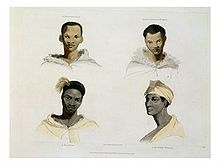- Hottentots
-
Khoïkhoï
 Pour la ville de Khoï en Iran, voir Khoy.
Pour la ville de Khoï en Iran, voir Khoy.Khoïkhoï 
Populations significatives par régions  Afrique du Sud
Afrique du SudPopulation totale Langue(s) Religion(s) Les Khoïkhoï (ou Khoekhoen ou Kwena), littéralement « Hommes des hommes », s'intitulent eux-mêmes ainsi par opposition à leurs voisins d'Afrique australe les Bochimans, qu'ils nomment Sankhoï. Ces deux peuples — dont le premier vit d'élevage et le second de chasse et cueillette — parlent des langues apparentées que l'on a regroupées sous le nom de khoïsan. Présents dans cette partie du monde depuis une trentaine de milliers d'années et auteurs de remarquables gravures et peintures rupestres, ils ont été progressivement refoulés par une vague bantoue au cours des trois derniers millénaires. L'arrivée des colons hollandais, huguenots puis britanniques a accentué leur déclin.
C'est aux clics (claquements) caractéristiques des langues khoïsan que les Khoïkhoï durent d'être désignés sous le sobriquet de « Hottentots » par les Afrikaners, ce terme évoquant ce qui était perçu comme un bégaiement.
Voir aussi
Bibliographie
- (en) Emile Boonzaier (et al.), The Cape herders : a history of the Khoikhoi of Southern Africa, Ohio University Press, 1996, 147 p. (ISBN 0821411748)
- (en) Richard Elphick, Kraal and castle : Khoikhoi and the founding of white South Africa, Yale University Press, New Haven, 1977, 266 p. (ISBN 0300020122) (thèse de 1972 remaniée)
- (en) Leonard Guelke et Robert Shell, « Landscape of conquest : frontier water alienation and Khoikhoi strategies of survival, 1652-1780 », in Journal of Southern African Studies, 18, 4, 1992, p. 803–824
- (en) Susie Newton-King, Background to the Khoikhoi rebellion of 1799-1803, Institute of Commonwealth Studies, Londres, 1978, 21 p. (communication)
- (en) Susan Newton-King et V. C. Malherbe, The Khoikhoi Rebellion in the Eastern Cape (1799-1803), University of Cape Town, Le Cap, 1981, 136 p. (ISBN 0799204110)
- (en) Kenneth Parker, (Un)utterably other others : the Khoikhoi at the Cape and early modern English voyagers, Institute of Commonwealth Studies, University of London, Londres, 1993, 7 p.
- (en) Robert Ross, The Kat River, rebellion and Khoikhoi nationalism : the fate of an ethnic identification, Institute of Commonwealth Studies, University of London, Londres, 1997, 15 p. (communication)
- (en) Andrew B. Smith, « Development of Khoikhoi society in South Africa: implications for pastoral archaeology », in Origini, vol. 13, 1984-7, p. 409-24
- (en) Andrew B. Smith, The Khoikhoi at the Cape of Good Hope : seventeenth-century drawings in the South African Library, The Library, Le Cap, 1993, 84 p. (ISBN 0869681044)
- (en) Russell Viljoen, « Aboriginal khoikhoi servants and their masters in Colonial Swellendam, South Africa, 1745-1795 », in Agricultural history, 2001, vol. 75, no 1, p. 28-51
- (en) Russel Stafford Viljoen, Jan Pearl, a Khoikhoi in Cape colonial society, 1761-1851, Brill, Leyde, 2006, 213 p. (ISBN 9004150935)
- (fr) Joseph Deniker, « Les Hottentots au Jardin d'Acclimatation », Revue d'Anthropologie, 1899, 3e série, tome 4, fasc. 1
- (fr) François-Xavier Fauvelle-Aymar, L'invention du Hottentot : histoire du regard occidental sur les Khoisan, XVe-XIXe siècle, Publications de la Sorbonne, Paris, 2002, 415 p. (ISBN 2-85944-445-9) (thèse de 1999 remaniée)
- (fr) Lindie Meyer, Barbara Benjamin et Jean Moreau, Les Khoikhoi, Musée Commémoratif des Huguenots, Franschhoek, 1996 (ISBN 9781919892702)
Liens externes
- (en) The Khoikhoi (sur le site The Khoisan)
- Portail de l'anthropologie
- Portail de l’Afrique du Sud
Catégorie : Groupe ethnique d'Afrique du Sud
Wikimedia Foundation. 2010.

